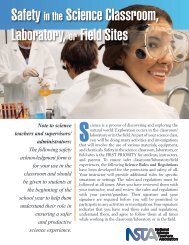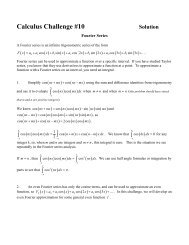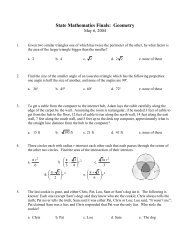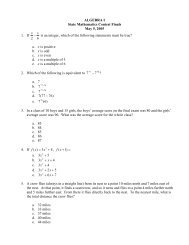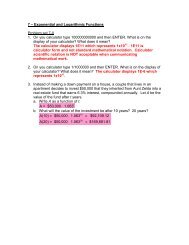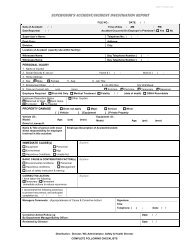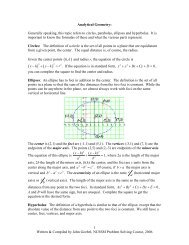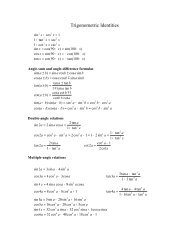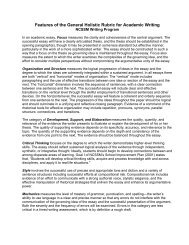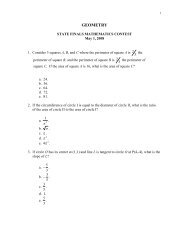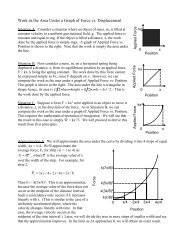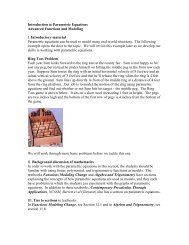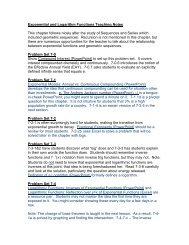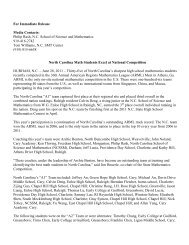NCSSM COURSE CAtAlOG - North Carolina School of Science and ...
NCSSM COURSE CAtAlOG - North Carolina School of Science and ...
NCSSM COURSE CAtAlOG - North Carolina School of Science and ...
Create successful ePaper yourself
Turn your PDF publications into a flip-book with our unique Google optimized e-Paper software.
EN446 Western Civilization: Wisdom, Revelation, Reason & Doubt III (The Modern<br />
World)<br />
One trimester<br />
Credit: One unit core English credit, one unit core elective credit.<br />
Prerequisite: Completion <strong>of</strong> three trimesters <strong>of</strong> AS303 Writing <strong>and</strong> American<br />
Studies or AS305 American Studies or completion <strong>of</strong> two trimesters <strong>of</strong> AS303 or<br />
AS305 <strong>and</strong> permission <strong>of</strong> the Dean <strong>of</strong> Humanities.<br />
Meeting pattern: Four periods per week including lab.<br />
This interdisciplinary, team-taught course provides a survey <strong>of</strong> modern Europe<br />
from the late eighteenth century to the present. The course emphasizes skills in<br />
reading, writing, critical thinking, research, <strong>and</strong> public speaking. Through<br />
analyzing a variety <strong>of</strong> texts, students explore the French Revolution,<br />
Romanticism, the Industrial Revolution, Imperialism, Modernism, Communism,<br />
Feminism, World Wars I & II, the Cold War, Existentialism, Post-Modernism,<br />
Globalization, <strong>and</strong> the European Union. Readings are selected from works by<br />
Rousseau, Mill, Marx, Jane Austen, Tolstoy, Nietzsche, Freud, Sartre, Virginia<br />
Woolf, <strong>and</strong> Tom Stoppard. Some questions the course addresses include: How<br />
have people organized their societies <strong>and</strong> why? How has religion shaped their<br />
lives? How has the individual been defined, <strong>and</strong> what have been the limits <strong>and</strong><br />
possibilities for exercising free-will in different cultural contexts? How have<br />
people defined themselves in relationship to nature? How have ethical <strong>and</strong><br />
moral systems been created, <strong>and</strong> how have they functioned? What has been<br />
the role <strong>of</strong> the arts in each culture? What are the lasting influences <strong>of</strong> these<br />
events <strong>and</strong> ideas on the world today?<br />
CROSS-LISTED <strong>COURSE</strong>S<br />
Courses listed below are interdisciplinary courses in English <strong>and</strong> at least one<br />
other subject area. Full course descriptions <strong>and</strong> credit information may be<br />
found in the areas indicated.<br />
IE318 Shakespeare in Performance<br />
Read description under Interdisciplinary Elective Courses.<br />
IE320 <strong>Science</strong>, Math, <strong>and</strong> Theater<br />
Read description under Interdisciplinary Elective Courses.<br />
IE354 Introduction to the Research Experience<br />
Read description under Interdisciplinary Elective Courses.<br />
IE356 Engineering the Modern: The Twentieth-Century American Aesthetic in its<br />
Cultural <strong>and</strong> Historical Context<br />
Read description under Interdisciplinary Elective Courses.<br />
24



